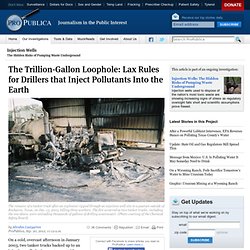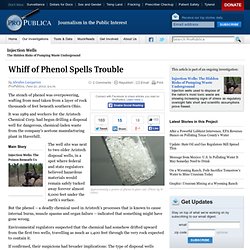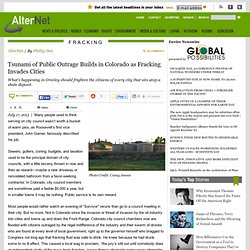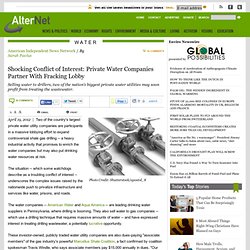

Science, Democracy, and Fracking: A Guide for Community Residents and Policy Makers Facing Decisions over Hydraulic Fracturing.
The Trillion-Gallon Loophole: Lax Rules for Drillers that Inject Pollutants Into the Earth. The remains of a tanker truck after an explosion ripped through an injection well site in a pasture outside of Rosharon, Texas, on Jan. 13, 2003, killing three workers.

The fire occurred as two tanker trucks, including the one above, were unloading thousands of gallons of drilling wastewater. (Photo courtesy of the Chemical Safety Board) The truck engines, left to idle by their drivers, sucked the fumes from the air, revving into a high-pitched whine. Before anyone could react, one of the trucks backfired, releasing a spark that ignited the invisible cloud. Whiff of Phenol Spells Trouble. The well site was next to two older Aristech disposal wells, in a spot where federal and state regulators believed hazardous materials would remain safely tucked away forever almost 6,000 feet under the earth’s surface.

But the phenol – a deadly chemical used in Aristech’s processes that is known to cause internal burns, muscle spasms and organ failure – indicated that something might have gone wrong. Environmental regulators suspected that the chemical had somehow drifted upward from the first two wells, travelling as much as 1,400 feet through the very rock expected to contain it. If confirmed, their suspicions had broader implications: The type of disposal wells Aristech was using were among the most stringently regulated and monitored in the country. A leak would mean that even injection wells subject to the strictest regulations might not be as safe as scientists thought. New Anti-Fracking Film by Gasland's Josh Fox Targets Cuomo: 'Governor, What Color Will the Sky Be Over New York?'
Tsunami of Public Outrage Builds in Colorado as Fracking Invades Cities. Photo Credit: Conny Jensen July 17, 2013 | Like this article?

Join our email list: Stay up to date with the latest headlines via email. Many people used to think serving on city council wasn’t worth a bucket of warm piss, as Roosevelt’s first vice president, John Garner, famously described his job. Sewers, gutters, zoning, budgets, and taxation used to be the principal domain of city councils, with a little larceny thrown in now and then as reward—maybe a new driveway or remodeled bathroom from a favor-seeking contractor. Most people would rather watch an evening of “Survivor” reruns than go to a council meeting in their city. Fracking to blame? Texas rocked by 16 earthquakes in last 3 weeks. Seismologist: Fracking Injection Wells Linked to Earthquakes. Fracking. Media.ccomrcdn.com/media/station_content/650/Thursday_6-21_Hour_2_1340291039_18961.mp3.
Health. US can become world's biggest oil producer in a decade, says IEA. The US can shed its longstanding dependence on Saudi Arabian oil within the next decade, redrawing the world's political systems and potentially leading to runaway global warming.

In a report released on Monday, the world's foremost energy watchdog, the International Energy Agency (IEA), said the US would benefit from so-called unconventional sources of oil and gas, including shale gas and shale oil, derived from fracking – blasting dense rocks apart to release the fossil fuels trapped within. These sources could fuel the US's energy independence, and make the country the world's biggest oil producer by 2017. But, if pursued with vigour, they would also lead to huge increases in greenhouse gas emissions that would put hopes of curbing dangerous climate change beyond reach.
Shocking Conflict of Interest: Private Water Companies Partner With Fracking Lobby. Photo Credit: Shutterstock/apostol_8 April 19, 2012 | Like this article?

Join our email list: Stay up to date with the latest headlines via email. Two of the country's largest private water utility companies are participants in a massive lobbying effort to expand controversial shale gas drilling -- a heavy industrial activity that promises to enrich the water companies but may also put drinking water resources at risk.
The situation -- which some watchdogs describe as a troubling conflict of interest -- underscores the complex issues raised by the nationwide push to privatize infrastructure and services like water, prisons, and roads. The water companies -- American Water and Aqua America -- are leading drinking water suppliers in Pennsylvania, where drilling is booming. Both water companies serve millions of people across the country -- Aqua America operates in 11 states and American Water in more than 30. Unregulated Fracking for Decades? Why California May Be a Disaster Waiting to Happen. Photo Credit: Shutterstock April 5, 2012 | Like this article? Join our email list: Stay up to date with the latest headlines via email. Editor's Note: Check out AlterNet's new special coverage page on fracking.
Thanks to the smoking gun of Josh Fox's sobering documentary Gasland, hydraulic fracturing has finally entered our renewable news cycle. The situation became less clear after a recent investigative report from DC-based nonprofit Environmental Working Group explained that California has experienced 60 unregulated years of widespread fracking, whose technical methods and geographical locations in the seismically active state exist outside of the public purview. "Since our report came out, the Brown administration hasn't been happy with it," Bill Allayaud, EWG's California director of government affairs, told AlterNet by phone. Drilling Tracker. ProPublica has collected data from oil and gas producing states for a nine-year period starting in 2003, compiling numbers on new wells, enforcement staffing, enforcement actions and more.
In most states, regulatory agencies that oversee oil and gas drilling are also responsible for overseeing underground injection wells for drilling waste, known as Class 2 wells. Below are the total number of new wells drilled per year and the enforcement staff and budget numbers from 2003 to 2011 for the 22 states that supplied the most complete data. Since 2003, the number of new wells drilled in these states increased 28 percent, while enforcement staff grew only 15 percent. See limitations. Wells Drilled: Change Since 2003 Wells Drilled Oil And Gas Enforcement Staff: Change Since 2003.